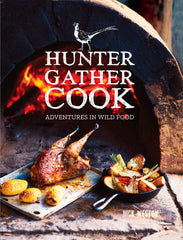
Top 5 Foraging Books - Recommended by The Expert (...and Book Lover)
If you have not already attended Wild Food Foraging & Cookery at Ground Up Cookery School, this is of course the best starting place to learn and we hope to see you there! In the meantime check out these wonderful books. Keep eating seasonally and sustainably. The one thing that will not be increasing in price over the coming months are the weeds!!
One word of caution, if you are in any doubt about what you are eating our number one rule on our course is check a different resource until you are certain. If not do not eat it.
1. Food For Free - Richard Mabey
If you only buy one book you have to go for The Collins Gem, Food for Free by Richard Mabey.
2.Edible Seashore - John Wright
We love the whole range of River Cottage Handbooks especially No.5 Edible Seashore.
This coastal foraging book is slightly larger than pocket size and being hardback it is quite heavy, but not too inconvenient if you are primarily out foraging by the sea anyway.
The introduction is a little wordy, but full of essential facts which need to be understood before any foraging can take place. It covers, guidance, rules, equipment and safety information.
The bulk of the book is broken down into 4 sections to help the forager identify their ingredient. These are The Flowering Plants, The Seaweeds, The Molluscs and The Crustaceans. Each ingredient has 2 - 4 pages allocated to it. The reason that we love this book is the very clear photographs of the find. Many have 2 or even 3 photographs so that the forager really feels safe identifying their collection.
The text is chatty and clear, detailing how, when where you will find your spoils. It gives both common and Latin names. There are details on how to prepare each ingredient and a section with interesting facts from historical references and medicinal uses to warnings and safety information so as not to poison yourself or your guests!
The last quarter of the book is dedicated to some delicious River Cottage HQ recipes.
3. The Forager's Calendar - John Wright
The Forager's Calendar: A Seasonal Guide to Nature's Wild Harvest is a bit larger still, you could take it out and about, but its probably better used in conjunction with one of the above books to plan your foraging hike. It is very helpfully laid out month by month as the title implies. It is also available in audio book.
As with all good foraging books the first few sections give useful guidance on the law, safety and collection of wild food. The bulk of the book is broken down into months. Each chapter starts with a list of what you might find when out on walk. Each section gives common and Latin names and when you might find the species and harvest different parts of it. The descriptions and photographs are quite limited. This book is great as an overview to plan your harvest and is best used in partnership with another book for clear identification. This book has an excellent section on Poisonous Species to avoid. Thankfully, most wild food in the UK will just make you ill and will not kill you. This is a great book for a new forager starting out and building confidence safely.
4. Hunter Gather Cook: Adventures in Wild Food - Nick Weston
A fellow Cookery School, with a slightly different approach to us. Hunter Gather Cook focus on cooking outdoors whereas on our Wild Food Foraging & Cookery Course Ground Up Cookery School, we focus on recipes that you might cook in your own kitchen at any time.
With beautiful rustic images, this would make a beautiful coffee table book as well as featuring amongst your cookery books. It is great book for lovers of nature and back to basics who are also avid foodies.
This book is written by a foraging chef who packed in life in the city to live in the great outdoors and eat what nature has to offer... in a nice way, no nettle soup here! This is not a book for the vegetarian forager and features meat pretty heavily and graphically. There is a brief section on finding and identifying plants, however, the emphasis is on outdoor cooking on fire.
5. Wild Food: A complete Guide for Foragers - Roger Phillips
This is another inspiring book for outdoorsy people, it is large and heavy so definitely a resource to refer to before hitting the great outdoors. It is divided into sections for each food type. As with the other books each ingredient is named its common form and Latin, with a brief description. The photographs are large, but maybe not quite as crisp as I would like for identification, so as always I would definitely recommend a second resource to confirm identification if in doubt. Alongside each ingredient are a number of tasty and original recipes. This is a great comprehensive guide for keen foragers and food lovers alike. There is a fantastic section on mushrooms however, I will be writing a similar blog specific to fungi in the coming weeks as it is a topic which really needs specialist books and knowledge....watch this space!
For seasonal tips, guidance and recipes follow us on Instagram, Facebook or Linked in.
We have added links to Amazon both for ease of shopping, but also to receive a small commission. Of course you can shop around and support small booksellers, which we love too!
Get into nature, get picking and create some delicious truly British dishes.... or gift these books to your friends so they can do it for you!









